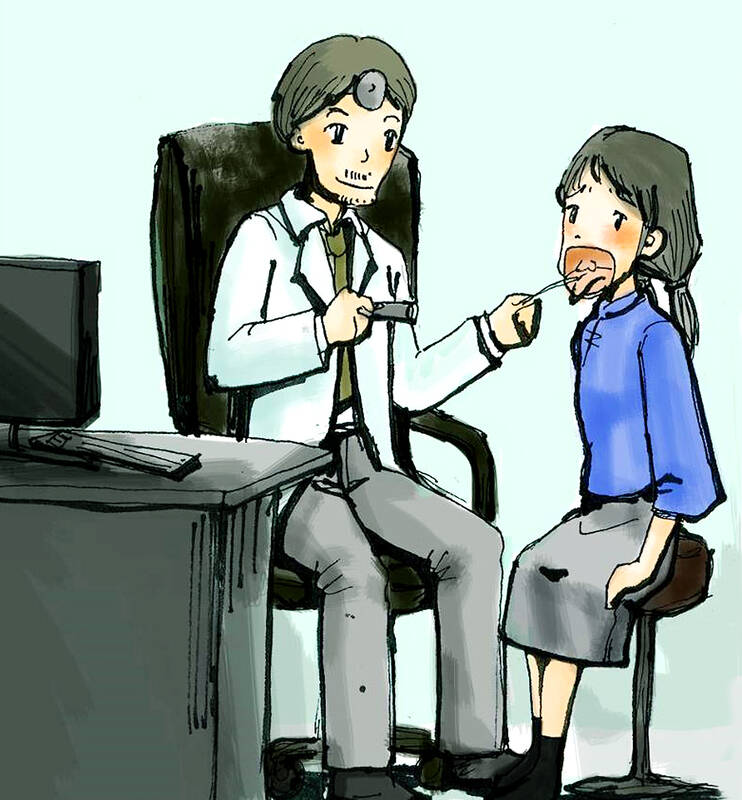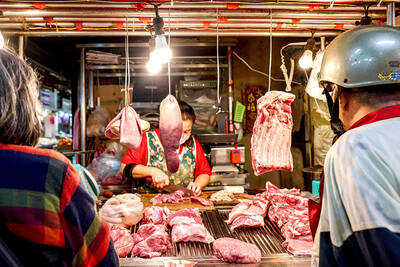情境對話 Situational Dialogues
醫生:你怎麼了?哪裡不舒服?
病人:我這一個星期常頭痛、打噴嚏。不知道是不是感冒?

醫生:怎麼不早點兒來看病?
病人:因為我想沒關係,所以自己先吃了兩天的成藥。
醫生:好。我看看你的喉嚨和鼻子。是過敏。你剛來台灣嗎?
病人:我已經來了一個多月了。
醫生:台北比較潮濕,所以很多人有過敏的現象。
Doctor: What’s wrong with you? Where does it hurt?
Patient: I have a headache and been sneezing for a week. I am wondering if I caught a cold.
Doctor: Why didn’t you come earlier?
Patient: I didn’t think it was serious, so I took medicine without any prescription.
Doctor: OK, let me check your throat and nose. It’s allergies. Did you just come to Taiwan?
Patient: I have been here for over a month.
Doctor: Taipei is quite humid and wet, so it is very common to have allergies here.
生詞表 Vocabulary
舒服 (shūfú) be comfortable
頭痛 (tóutòng) headache
打噴嚏 (dǎpēntì) to sneeze, make a sneeze
過敏 (guòmǐn)) to be allergic / allergy (-ies)
所以 (suǒyǐ) so, therefore
Get To Know Taiwan 生活小補帖
Health Care System
台灣在1995年3月開辦全民健保制度。這項醫療制度對台灣人民來說,算是一項重大的社會福利制度,因為只要是合法的台灣國民,同時每個月按時繳納健保費,就有一張健保IC卡。平日如有任何需要,便可憑此卡就醫。
The National Health Insurance (NHI) program was launched in March, 1995. The NHI program is a compulsory and inclusive insurance, so anyone who is eligible for the NHI should enroll in the program and pay a monthly premium. Eligible people include resident Taiwan citizens and foreign Alien Residence Card holders. If people have any health issues, they can go with the insurance card to see a doctor.
教材音檔 Audio Files
本文內容及音檔來源: 華語簡易通
For more audio files, visit the center’s Web site at: http://mtc.ntnu.edu.tw/book/book-show-6.html
國立臺灣師範大學國語教學中心提供
Provided by NTNU Mandarin Training Center: http://www.mtc.ntnu.edu.tw/
COPYRIGHT c 2022 國立臺灣師範大學國語教學中心 ALL RIGHTS RESERVED

Pigs that are resistant to a deadly viral disease have been created by scientists at Edinburgh’s Roslin Institute. The gene-edited animals remained healthy when exposed to classical swine fever (CSF), a highly contagious and often fatal disease. The virus was eradicated in the UK in 1966, but there have been several outbreaks since and it continues to pose a major threat to pig farming worldwide. “Classical swine fever is a devastating disease for livestock and farmers as we saw with the outbreak in the UK, 25 years ago,” said Helen Crooke, mammalian virology deputy leader at the Animal and Plant Health Agency

Have you ever seen a circular intersection where cars continuously flow in one direction around a central island? That is a “roundabout,” a well-known alternative to traditional intersections. Drivers enter and exit at different points without relying on traffic lights. Their primary purpose is to improve traffic flow and minimize the likelihood of high-speed collisions, particularly dangerous T-bone and head-on crashes. Roundabouts have existed and been implemented for over a century. In the 1960s, the modern roundabout emerged in the UK, with added rules for yielding. Unlike intersections with red lights, roundabouts allow vehicles to continue moving at a

A: So you’re reading Jin Yong’s martial arts novel again? B: Yup, Jin’s novels are so fascinating, especially the trilogy: “Legends of the Condor Heroes,” “Return of the Condor Heroes,” and “Heaven Sword and Dragon Saber.” A: The late novelist published his first story in 1955, which means this year marks the 70th anniversary of his “wuxia” world. B: Wasn’t an English version of “Legends of the Condor Heroes” also released in 2018? A: Yes, but the debate over the translation of kung fu moves continues — like the evil move “Nine Yin Skeleton Claw.” A: 你又在重讀金庸的武俠小說啦? B:

對話 Dialogue 清清:明天我想請一天假。 Qīngqing: Míngtiān wǒ xiǎng qǐng yì tiān jià. 華華:為什麼?這個月的假已經很多了,你還要請假啊? Huáhua: Wèishénme? Zhège yuè de jià yǐjīng hěn duō le, nǐ háiyào qǐngjià a? 清清:因為明天是農曆九月初九重陽節,重陽節是老人節,我想陪我阿公阿嬤去爬山,而且家裡也要拜祖先,請假比較方便。 Qīngqing: Yīnwèi míngtiān shì nónglì jiǔ yuè chū jiǔ Chóngyáng Jié, Chóngyáng Jié shì Lǎorén Jié, wǒ xiǎng péi wǒ āgōng āma qù páshān, érqiě jiālǐ yě yào bài zǔxiān, qǐng jià bǐjiào fāngbiàn. 華華:了解,是應該陪老人出去走走。阿公阿嬤應該會拿到政府發的紅包吧? Huáhua: Liǎojiě, shì yīnggāi péi lǎorén chūqù zǒuzǒu. Āgōng āma yīnggāi huì nádào zhèngfǔ fā de hóngbāo ba? 清清:有啊!65歲以上的長輩都會領到敬老金,只是每個縣市給的數字不太一樣,年紀越大,拿到的會越多喔! Qīngqing: Yǒu a! Liùshíwǔ suì yǐshàng de zhǎngbèi dōu huì lǐngdào jìnglǎojīn, zhǐshì měi gè xiànshì gěi de shùzì bútài yíyàng, érqiě niánjì yuè dà, ná dào de huì